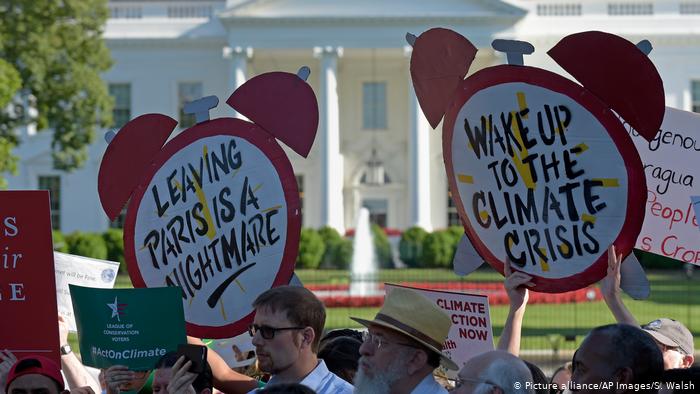The US has formally left the 2015 Paris climate agreement. Future US participation in the international pact will depend on the outcome of the presidential election.
The United States formally left the Paris climate accord on Wednesday, becoming the first country in the world to withdraw from the international climate pact aimed at reigning in greenhouse emissions.
President Donald Trump's administration had notified the United Nations last year of the US withdrawal from the accord. The mandatory one-year waiting period required for it to exit ended on Wednesday.
The fate of the US participation in the Paris agreement now rests on the outcome of the presidential election.
Trump to keep US out, Biden wants back in
Trump, a staunch opponent of the international accord, had first announced his intention to withdraw the US from the landmark agreement in 2017, but the UN rules prevented countries from leaving in the first three years.
If Trump were to be reelected, the US — the world's largest economy and the second-biggest polluter after China — would stay out of the accord.
During his presidency, Trump has questioned climate science on multiple occasions, championed the fossil fuel industry, and weakened environmental protections.
His Democratic rival Joe Biden, in contrast, has vowed to immediately rejoin the Paris agreement if he wins the presidential election.
Biden has called climate change and global warming "an existential threat to humanity" and that the US has a "moral obligation to deal with it."
Biden has also proposed a $1.7 trillion plan to bring US carbon emission to net-zero by 2050.
'Make or break'
Regardless of how the election turns out, the United States will still be "outside the conversation" when the UK and the UN host a climate summit on December 12, on the fifth anniversary of the Paris accord.
Climate scientists have warned the unless drastic action is taken, global temperatures may rise more than 2 degrees Celsius above pre-industrial levels, triggering a series of catastrophic climate tipping points by the end of the century.
This could be averted if global emissions reached net-zero by mid-century, according to the UN's Intergovernmental Panel on Climate Change.
Dutch Climate Scientist Niklas Hohne backed Biden's plan in a tweet on Tuesday.
"This election could be a make or break point for international climate policy," he said. "Biden's climate plan alone could reduce temperature increase in the order of 0.1°C. Every tenth of a degree counts."
Latest Stories
-
From Shack to Sanctuary: Rotary builds state-of-the-art healthcare facility in Berekuso
4 minutes -
‘Unite for Good’: Rotary International President-elect calls on Rotarians to be a force for unity
7 minutes -
Free speech has limits in national security matters – Law professor weighs in on Adu-Boahene’s trial
15 minutes -
DVLA gives 2-week deadline to register all excavators or face seizure
15 minutes -
Ghana’s FreezeLink gains international acclaim as Bloomberg recognises innovative Agri and Pharma solutions
16 minutes -
Garden City University College graduates cohort of Midwifery Research Studies
38 minutes -
“We don’t want our AG playing in the mud” – Nana B slams Dr Ayine over A Plus bribery claims
39 minutes -
FAGE president calls for targeted policy to support export, agribusiness
46 minutes -
African climate activists seek legal clarification on States’ climate obligations at African Court
51 minutes -
Man electrocuted during construction works near high voltage line
56 minutes -
IGP promotes armwrestling champion Grace Minta from Inspector to Chief Inspector
60 minutes -
Interior Minister presents 60 pickups, 20 motorbikes to police for 24-hour economy security
1 hour -
Exam malpractice a national security threat – WAEC warns
1 hour -
Ghana Energy Awards pays courtesy call on Ministry of Energy and Green Transition
1 hour -
Victoria Hamah’s open letter to President Mahama on Sammy Gyamfi’s dollar gift saga
1 hour

